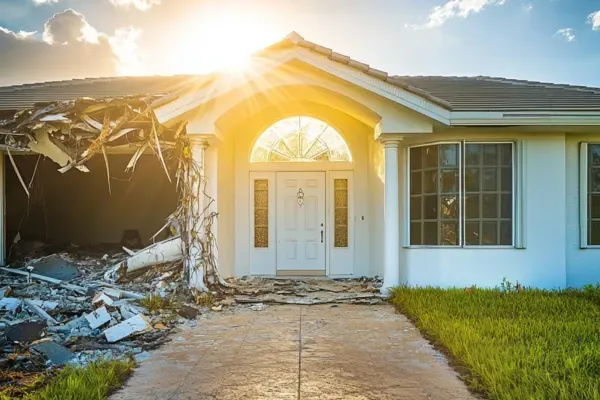
Can One Spouse Keep the House in Florida Divorce?
Last Updated: May 27, 2025
Article By: Jared A.
Going through a divorce is one of life’s most challenging experiences, and deciding what happens to the marital home can feel like an emotional and financial tug-of-war. If you’re wondering, can one spouse keep the house in Florida divorce, you’re not alone. This question weighs heavily on many couples navigating the dissolution of their marriage, especially when the home represents stability, memories, or a fresh start. In Florida, the process of determining who keeps the house is guided by equitable distribution laws, but the outcome depends on several factors, including financial circumstances, emotional attachments, and legal considerations. We understand how overwhelming this can feel, and we’re here to guide you through the process with clarity, compassion, and actionable solutions.

In this article, we’ll explore every angle of keeping the marital home in Florida divorce, from legal principles to practical steps you can take to stay in your home or negotiate a fair outcome. Whether you’re hoping to remain in the home, buy out your spouse, or avoid selling, we’ll provide the tools and knowledge to empower your decision-making. Let’s dive into the key aspects of this process, addressing your concerns with empathy and offering direction for a path forward.
Understanding Florida’s Equitable Distribution Laws
In Florida, divorce proceedings follow the principle of equitable distribution, which means marital assets, including the home, are divided fairly but not necessarily equally. The court considers various factors to determine how a judge decides who keeps the house in Florida. These factors include each spouse’s financial situation, contributions to the marriage (both monetary and non-monetary), and the best interests of any children involved. The goal is to ensure a fair outcome, but this can lead to complex decisions about the marital home.
For many, the home is more than just an asset—it’s a place of comfort and stability, especially during the upheaval of divorce. If you’re asking, can I stay in the house after divorce in Florida, the answer depends on your ability to demonstrate that keeping the home is feasible and equitable. Courts may award the house to one spouse if they can prove they have the financial means to maintain it, especially if children are involved and staying in the home provides continuity for them. However, if neither spouse can afford the home independently, the court may order it sold, with proceeds divided equitably.
At Florida Offer, we’ve spent years helping homeowners in Tampa, Sarasota, and St. Petersburg navigate the complexities of real estate during divorce. Our team understands the emotional weight of deciding how to keep the house in divorce in Florida and brings extensive experience in finding solutions that align with your goals. Whether you’re exploring options to stay in the home or considering a quick sale to move forward, we’re here to offer compassionate guidance and expert insights tailored to your situation.
Factors Influencing Who Keeps the Marital Home
When determining whether one spouse can keep the house, Florida courts consider several key factors. Understanding these can help you prepare a strong case if you’re hoping to stay in the home or negotiate with your spouse. Here are the primary considerations:
- Financial Capability: Can you afford the mortgage, property taxes, insurance, and maintenance costs on your own? Courts will assess your income, assets, and debts to determine if keeping the marital home in Florida divorce is financially viable.
- Contributions to the Marriage: This includes both financial contributions (e.g., who paid the mortgage) and non-financial contributions (e.g., homemaking or child-rearing). These factors can influence whether the house is awarded to one spouse in Florida.
- Children’s Best Interests: If you have children, courts prioritize stability. If one spouse is the primary caregiver and keeping the home allows the children to stay in their school district or community, this strengthens the case for that spouse to remain.
- Marital vs. Non-Marital Property: If the home was purchased during the marriage, it’s typically considered marital property, subject to equitable distribution. However, if one spouse owned the home before the marriage, it may be classified as non-marital property, complicating the division.
If you’re wondering, do I have to sell the house in divorce in Florida, the answer is no—not always. Selling the home is a common outcome when neither spouse can afford to keep it or when liquidating assets is necessary to achieve a fair division. However, with careful planning, you may have options to avoid a sale, such as buying out your spouse in a Florida divorce.
Continued Below
Options for Keeping the House in a Florida Divorce
If your goal is to stay in the marital home, there are several strategies to explore. Each option comes with its own set of challenges and requirements, so it’s essential to evaluate what works best for your situation. Here are the most common paths to how to keep the house in divorce in Florida:
1. Buying Out Your Spouse
One of the most straightforward ways to keep the home is to buy out your spouse in a Florida divorce. This involves paying your spouse for their share of the home’s equity, either through a lump-sum payment or by offsetting their share with other marital assets (e.g., retirement accounts or savings). To calculate the buyout amount, you’ll need to:
- Determine the Home’s Value: Hire a professional appraiser to assess the current market value of the home. According to a 2023 report from the Florida Realtors Association, the median home price in Florida was approximately $410,000, though this varies by location, such as higher values in Tampa or lower in areas like Lakeland (Florida Realtors, 2023).
- Calculate Equity: Subtract any outstanding mortgage balance from the home’s value to determine the equity. For example, if your home is worth $400,000 and you owe $200,000, the equity is $200,000, typically split equitably between spouses.
- Negotiate the Buyout: If you’re entitled to half the equity ($100,000 in this example), you’d need to pay your spouse their share, potentially $100,000, to keep the home.

A key question is, can I keep the house without refinancing in Florida? Refinancing is often required to remove your spouse’s name from the mortgage, as lenders typically won’t release a co-borrower without a new loan. However, in rare cases, you may negotiate with your spouse to assume the mortgage without refinancing, though this requires lender approval and proof of your ability to make payments.
2. Trading Assets
If you lack the cash for a buyout, you can offer to trade other marital assets. For example, you might relinquish your claim to a portion of a retirement account or other investments to offset your spouse’s share of the home’s equity. This approach requires careful valuation of all marital assets to ensure an equitable trade.
3. Co-Ownership (Temporary or Long-Term)
In some cases, spouses agree to co-own the home temporarily, especially if children are involved. For instance, one spouse may stay in the home until the children graduate, at which point the home is sold, and proceeds are divided. This arrangement requires clear legal agreements to avoid future conflicts.
4. Court-Ordered Award
If you and your spouse can’t agree, the court may decide how a judge decides who keeps the house in Florida. The judge will consider the factors mentioned earlier, such as financial capability and children’s needs. If you’re awarded the home, you’ll likely need to refinance or buy out your spouse to finalize the transfer.
Challenges of Keeping the House
While keeping the marital home in Florida divorce is a worthy goal, it comes with challenges that require careful consideration. We know how much the home may mean to you, and it’s natural to feel attached to the place where you’ve built memories. However, staying in the home may not always be the best financial decision. Here are some challenges to keep in mind:
- Affordability: Can you afford the ongoing costs of the home on a single income? This includes not only the mortgage but also property taxes, insurance, and maintenance. A 2024 study by the National Association of Realtors found that homeownership costs in Florida have risen by 15% over the past five years, making affordability a significant concern (NAR, 2024).
- Emotional Toll: Staying in the home may carry emotional baggage, as it’s a reminder of the marriage. Consider whether remaining in the home supports your emotional well-being or if a fresh start elsewhere might be more empowering.
- Refinancing Hurdles: If you need to refinance to remove your spouse’s name from the mortgage, you’ll need to qualify based on your income, credit score, and debt-to-income ratio. This can be challenging if your income has decreased post-divorce.
- Future Market Risks: If you keep the home but property values decline, you could face financial strain, especially if you’re stretched thin to maintain it.
If these challenges feel overwhelming, you might consider alternatives, such as selling the home. Companies like Florida Offer specialize in we buy houses solutions, offering cash for your home to simplify the process. For homeowners in Bradenton or Clearwater, we provide fast, fair offers to help you move forward without the stress of a traditional sale.
Steps to Qualify for Keeping the House
If you’re determined to stay in the home, you’ll need to demonstrate your ability to qualify to keep the house in divorce in Florida. Here’s a step-by-step checklist to guide you:
- Assess Your Finances: Review your income, expenses, and debts to ensure you can cover all home-related costs. Create a detailed budget to present to the court or your spouse.
- Get a Home Appraisal: Obtain a professional appraisal to establish the home’s value and equity, which is critical for buyout negotiations.
- Explore Refinancing Options: Contact lenders to see if you qualify for a refinance. Provide documentation of your income, credit score, and assets.
- Consult an Attorney: Work with a divorce attorney experienced in Florida law to advocate for your interest in keeping the home.
- Negotiate with Your Spouse: If your spouse wants to keep the house in Florida, be prepared to negotiate terms, such as trading assets or agreeing to a delayed sale.
- Prepare for Court: If the decision goes to court, gather evidence of your financial stability, contributions to the home, and the benefits of staying (e.g., for children).
Alternatives to Keeping the House
If keeping the home isn’t feasible, you have other options to achieve a fair and stress-free outcome. For some, selling the home and dividing the proceeds is the simplest solution, especially if neither spouse can afford to maintain it. If you’re thinking, I need to sell my house fast, there are solutions tailored to your needs:
- Traditional Sale: List the home with a realtor, though this can take months and involve repairs or staging.
- Cash Sale: Work with a company that buys houses like Florida Offer, which offers cash offers on houses for a quick, hassle-free sale. This is ideal if you’re in Sarasota or St. Petersburg and want to avoid the stress of a prolonged sale.
- Sell As-Is: If the home needs repairs, you can sell the house as is to home investors who specialize in companies buying houses for cash. This eliminates the need for costly updates.
Selling the home can provide financial relief and a fresh start, allowing both spouses to move forward without the burden of an unaffordable property. At Florida Offer, we specialize in we buy homes solutions, offering fast cash for your home to simplify the process during this challenging time.
Moving Forward with Confidence
Deciding whether one spouse can keep the house in Florida divorce is a deeply personal and complex decision. Whether you’re fighting to stay in the home or exploring alternatives like selling, the key is to approach the process with clarity and confidence. We know how difficult it is to navigate these choices while dealing with the emotional weight of divorce, and we’re here to support you every step of the way.
By understanding Florida’s equitable distribution laws, exploring buyout options, and preparing a strong financial case, you can increase your chances of keeping the marital home in Florida divorce. If selling is the best path, companies like Florida Offer can provide a cash buyer for homes, ensuring a quick and fair process. Whatever you choose, prioritize your financial stability and emotional well-being to build a brighter future.
At Florida Offer, we’re committed to helping homeowners in Tampa, Bradenton, and beyond find solutions that work. Whether you’re asking, can I stay in the house after divorce in Florida, or looking to sell your house for cash, our team is here to offer compassionate, expert guidance. Take the first step today by exploring your options and making informed decisions that empower your next chapter.
This article is based on the expert real estate experience of Florida Offer. For personalized financial or legal advice, we recommend consulting with a licensed professional, such as a CPA, attorney, or government official, to ensure your decisions align with your specific circumstances.
We Offer a Free Consultation. Find Answers Faster & Easier!
More Topics for You:
Home Sellers Resources:
© 2026 Florida Offer. All rights reserved.






